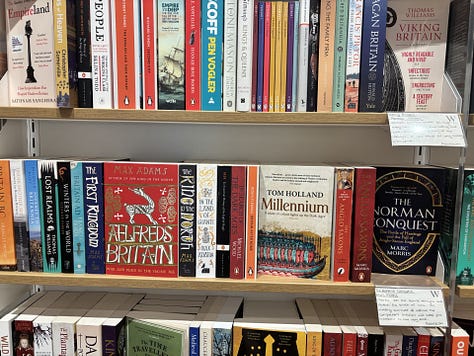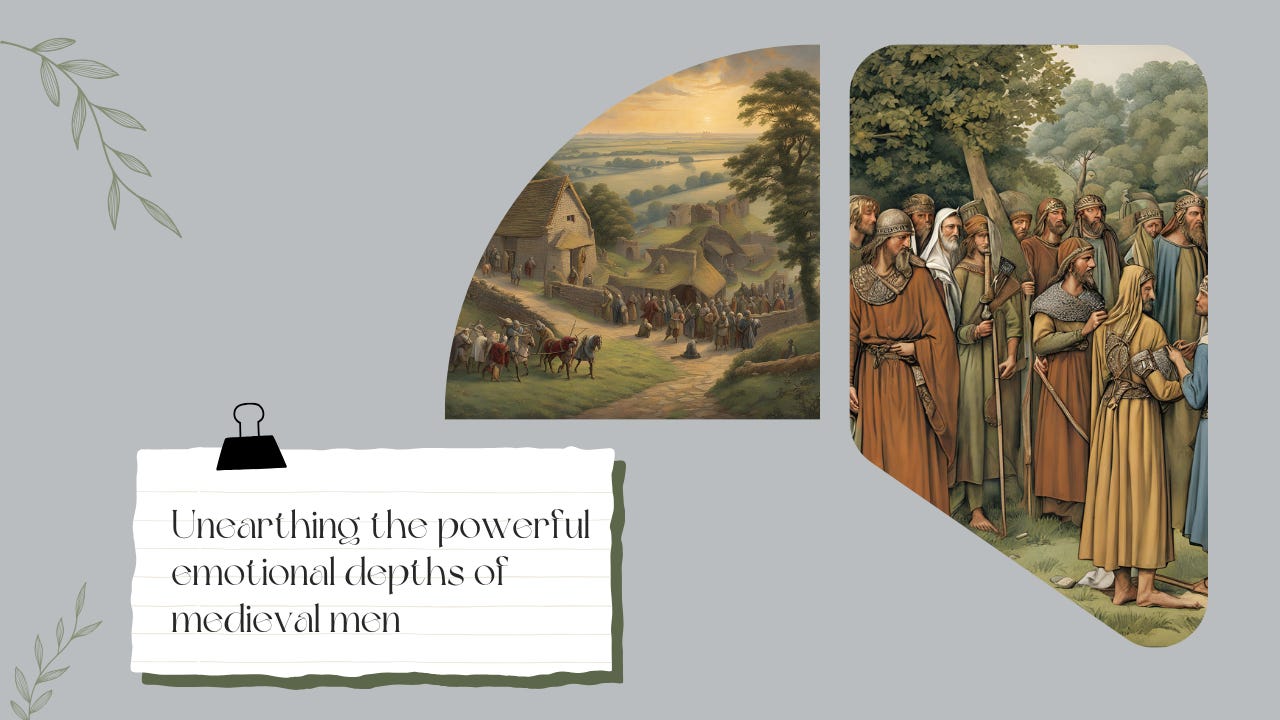Unearthing The Powerful Emotional Depths of Medieval Men
Augustine's Fear In The Face Of The Britons
A classic critique of medieval history is that it is all about kings, battles, and masculine mistreatment of women. And it’s not difficult to see where this view comes from: take a look at the history shelf in any popular bookstore and you’ll find it littered with titles such as ‘The Battles That Saved England’, ‘The First Kingdom’ or ‘The Battle of Hastings and the Fall of Anglo-Saxon England’, contrasted with feminist histories seeking to show the systemic mistreatment of women by rich white men.1



These are important tales to tell.
But what if I told you that this is not actually the sum total of what we know about medieval history? That it doesn’t need to just be about kings, battles, and sexism?
What if I told you that we could study medieval history without falling into either trap of misogyny or feminism?2
Now – just as a caveat. The majority of our sources for the early medieval period (we’re talking c. A.D. 600-1000 here) do deal with kings and battles. Some are ecclesiastical texts that tell the life stories of monks and nuns, as well as their establishments. For the most part, though, it was the wealthy elites who were able to access the resources needed to put pen to paper. Literacy was at an all-time low post-Roman Empire, so ‘ordinary people’ simply weren’t able to write down their stories or have them written down for them.
If we approach the sources with nuance and an analytical mind, however, we can tell stories that are more interesting that the classic political histories that clutter our book shops.3
When I asked people on Notes what their image of medieval men was, it was really eye-opening for me.
pointed to the Lutrell Psalter of 1325, showing men and women working the fields alongside one another, with ‘all hands required’. Alongside this were comments pointing to more comical figures such as Baldric from Blackadder or characters from Monty Python’s Holy Grail. There is truth, I’m sure, in each of these presentations of medieval men. None, however, connected them with being emotional, and I wonder how far that reflects the acceptability (or lack thereof) of masculine vulnerability in the twenty-first century.Yet some of my most popular posts on here have been those that show the vulnerable, emotional side of medieval masculinity.
Why? I think probably because we tend to focus on the macho-ness of historical men: how they fought valiantly, defeating their enemies and building up large stores of treasure. This is the view we get from most Netflix or Netflix-type portrayals of the past, right?


And, to be fair, this was often the yardstick by which early medieval writers measured their subjects. Bede, for example, said the following when he introduced Edwin, king of the Northumbrians:
The king’s earthly power had increased as an augury that he was to become a believer and have a share in the heavenly kingdom So, like no other English king before him, he held under his sway the whole realm of Britain, not only the English kingdoms but those ruled over by the Britons as well. He even brought the islands of Anglesey and Man under his power.4
Did you catch the gist of his praise for Edwin? Bede said he was a great king because he ruled over more of the English and the British than any king before him. Oh, and added to that he was a Christian, so he also extended the earthly kingdom of God as he ruled. Even better, in Bede’s eyes. A king who fought valiantly, defeating his enemies.
I am convinced, however, that the sources show us that the men who lived over a millennium ago were just as emotionally vulnerable as the men who live today. In order to bring out a rounded view of medieval men, it’s important that we share this side of them too.
In today’s article, I’ll be sharing a peculiar incident demonstrating the humanness (and vulnerability) of Augustine of Canterbury, the hero evangelist whose mission to Kent in A.D. 597 kickstarted the conversion of the Anglo-Saxon kingdoms of England. This continues a theme that has been a constant one since the very beginning of Telling Their Tales, seeking to uncover the more emotional sides of medieval men.
For those following along with Bertha’s Tale, we met Augustine in Instalment 17.
So, what happened?
[Pope] Gregory, prompted by divine inspiration, sent a servant of God named Augustine and several more God-fearing monks with him to preach the word of God to the English race. In obedience to the pope’s commands, they undertook this task and had already gone a little way on their journey when they were paralysed with terror. They began to contemplate returning home rather than going to a barbarous, fierce, and unbelieving nation whose language they did not even understand. They all agreed that this was the safer course; so forthwith they sent home Augustine whom Gregory had intended to have consecrated as their bishop if they were received by the English. Augustine was to beg St Gregory humbly for permission to give up so dangerous, wearisome, and uncertain a journey. Gregory, however, sent them an encouraging letter in which he persuaded them to persevere with the task of preaching the Word and trust in the help of God.5
Augustine had already departed for Britain when he and his companions decided that it was too scary a prospect and that they would be better off heading home.
To be fair to him, there were some pretty fierce descriptions of the Britons in the classic Roman histories that he’d probably read as preparation for his journey. Much of the picture he had of his destination would have been shaped by ancient histories that were written by people who had never even ventured to Britain, but Augustine would not have known this.
Why is this incident significant?
Though there had been significant groundwork laid by British, Irish, and Scottish Christians, as well as the women who had married exogamously, it is clear that Bede credited Augustine’s mission, and its successors, with the conversion of the Anglo-Saxon kingdoms. He spent a number of chapters explaining the depravity of pagan England6 as well as failed attempts at conversion prior to Augustine’s arrival. Augustine is the hero.
And yet Bede chose to include this incident that clearly shows Augustine’s weakness. His frailty. His less-than-perfection.
Why?
It is possible that Bede wanted to show that it was by God’s strength, rather than Augustine’s, that his hero was able to make it to England.
But it’s also possible that Bede wanted to show the realness of his hero: his humanity, his vulnerability. I think I, too, would be scared if I was being sent to a kingdom known (at least in the materials I’d read) for its utter depravity and wicked treatment of people! I’d probably want to turn back; I think it’s only human.
For our purposes, this incident shows that the men who feature in our history books – though, often, kings (or elite churchmen…) engaged in battles (or spiritual warfare…) – were emotional beings, behind the matter-of-fact accounts we usually hear of their lives.
They too were scared!
This is something that I explored in a number of previous articles through the poetry of Anglo-Saxon England, namely Beowulf, The Wanderer, and Wulf and Eadwacer. Click on the links below to check out how these poems, most likely written by men, reveal the way that they wrestled deeply with themes such as heartbreak, grief, and putting on a brave face to cover up the turmoil within.
It simply is not true that medieval people somehow didn’t feel things as deeply as we do.
I love the growing openness that there is around men sharing their experiences with poor mental health, anxiety, everyday worries, and so much more. How different might our stories of the past be if we start to recognise, and include in our histories, that the men of the past might also have experienced these things too?



I have nothing against these books in particular, and have actually read and enjoyed some of them. They are chosen merely to illustrate a point.
For the record, when they are researched and written well, I’m a big fan of feminist histories (though not the ones with a man-hatey slant). I am about to begin a PhD in women’s history, specifically the stories that we can’t uncover about them because the sources mostly write about men. I just don’t think that our histories need to be feminist in order to integrate better women’s stories.
Again, political histories are important, especially if we are to understand broad-brush themes like political, social, and cultural development, and as our understanding of the sources improves, we are always having to update these histories. My point is just that there are too many of the same types of book being published without having much to say that is new.
Bede, HE II.9. Tr. Colgrave & Mynors, p.84.
Ibid, I.23, p.37.
I know it wasn’t yet ‘England’ as we know it, but I use this term as shorthand for the Anglo-Saxon kingdoms that would later become England.










I agree with all of your points (especially in the footnotes) about the writing of history (I'm equally against *that* kind of feminism!) being repetitive and overly political rather than proper living social history.
I think I would have a different interpretation of the Augustine story and Bede's hagiography there, though. I don't think we can ignore the idea that this is in large part what we would now call 'propaganda'. You kind of hint at it when you say it's about 'God' giving Augustine strength/courage. But it's also about falsely portraying the pre-Christian British (the 'unruly Britons') in the worst possible light ('barbarian' etc.) who could 'only' be saved by (Roman) Christianity. In my - admittedly pagan prejudiced - view, Augustine (or his pope) did not have a noble mission - it was about bringing Britain under the subjugation of Rome - ironically, a distinctly 'patriarchal' system.
I'm also showing my bias here when I say I think the real and better Arthurian story is one I prefer, about the Celts introducing the Anglo-Saxon pagans to a more spiritual, earthy, magical version of Christianity (what I would also see as more akin to the 'original' spiritual version of Christianity). And then that, too, ends up being rewritten as a distinctly macho chivalric romance.
So I do think it's time to tell these stories from a different perspective. It's why I love what you're doing!